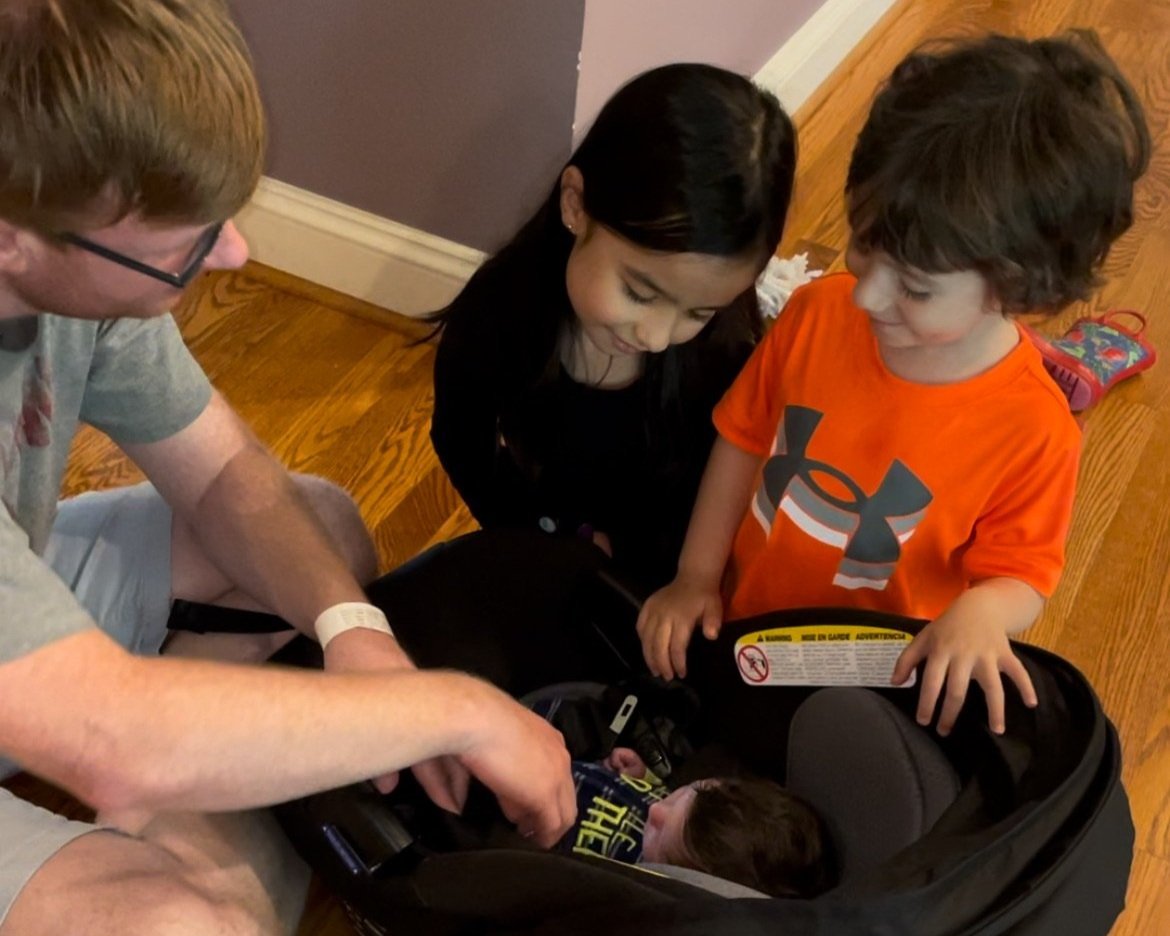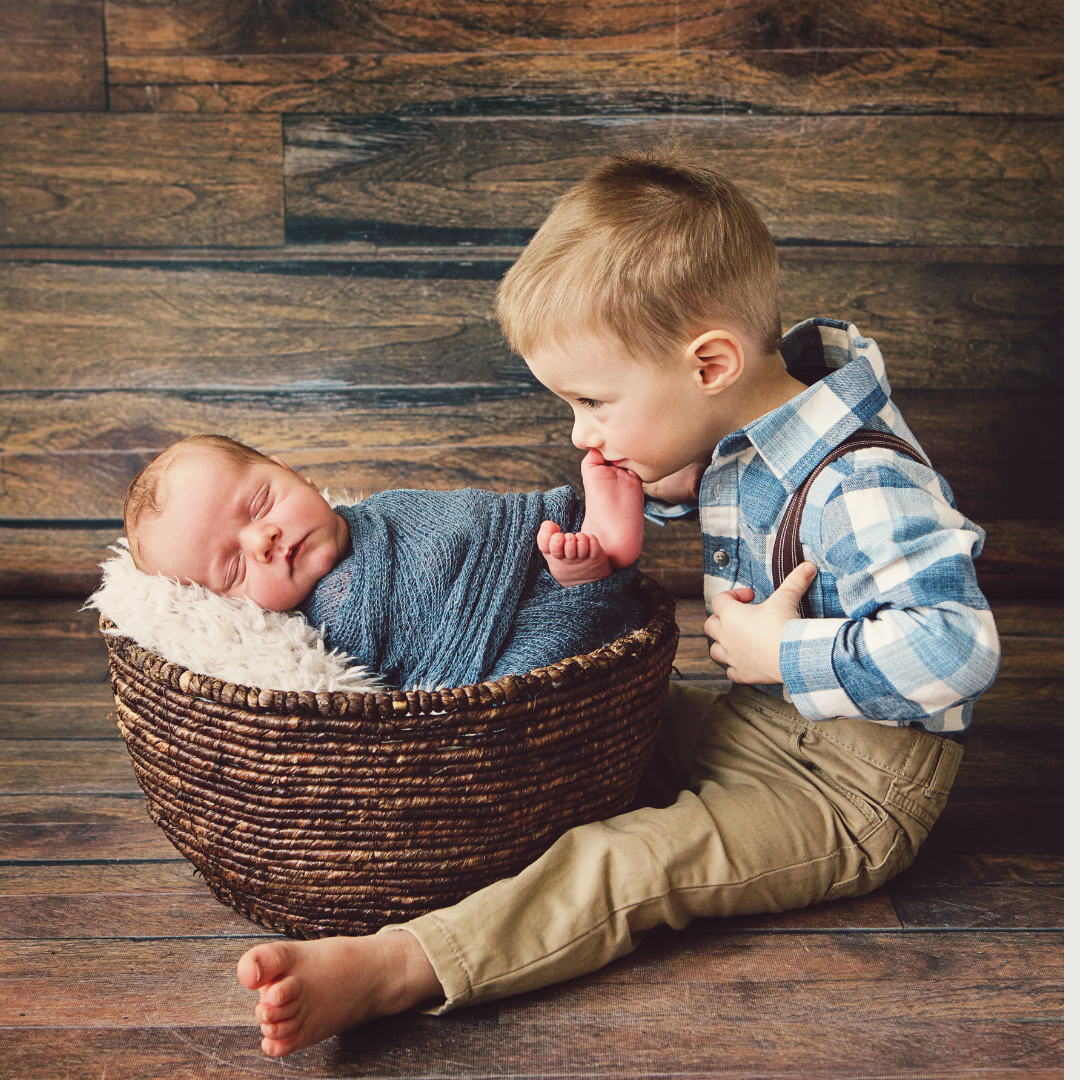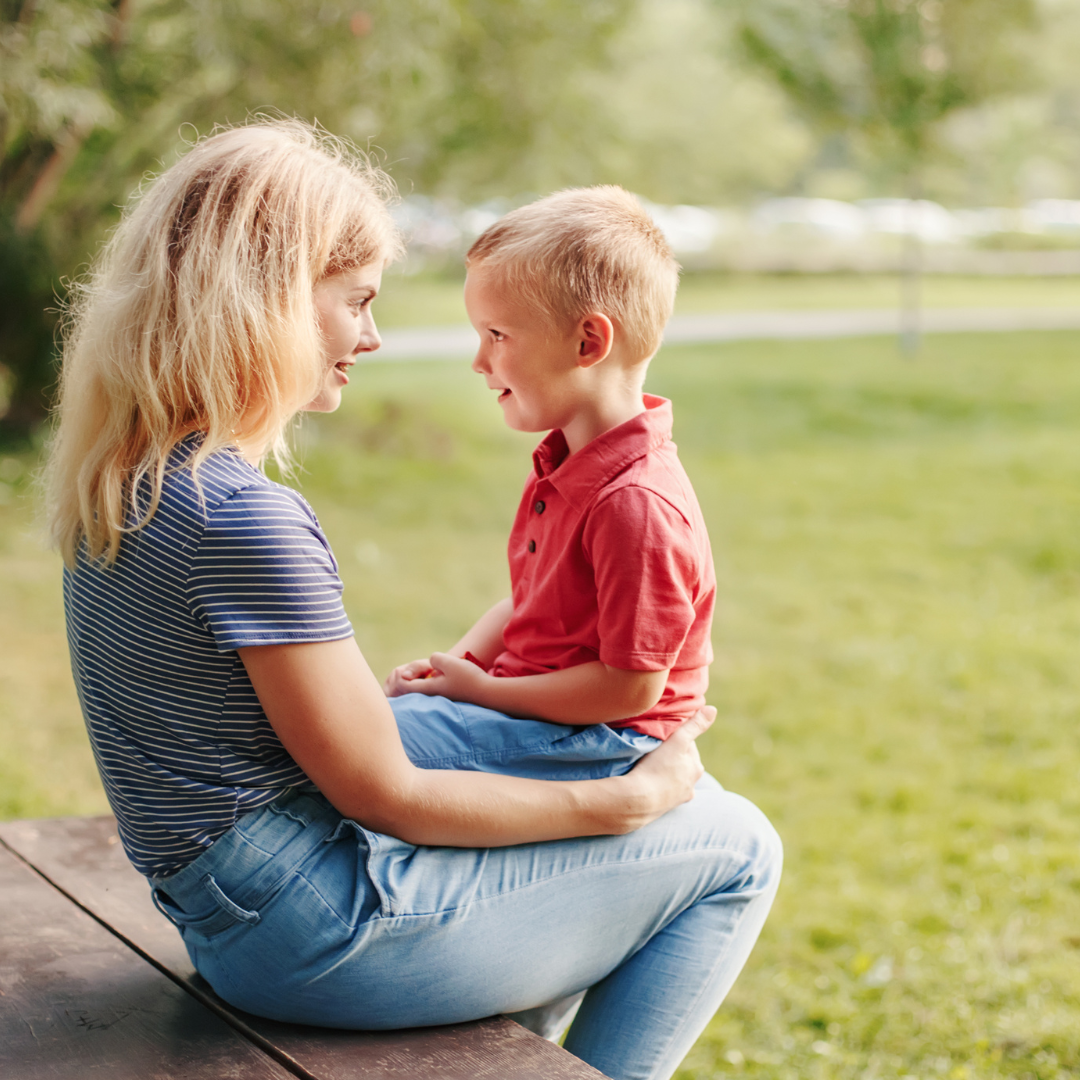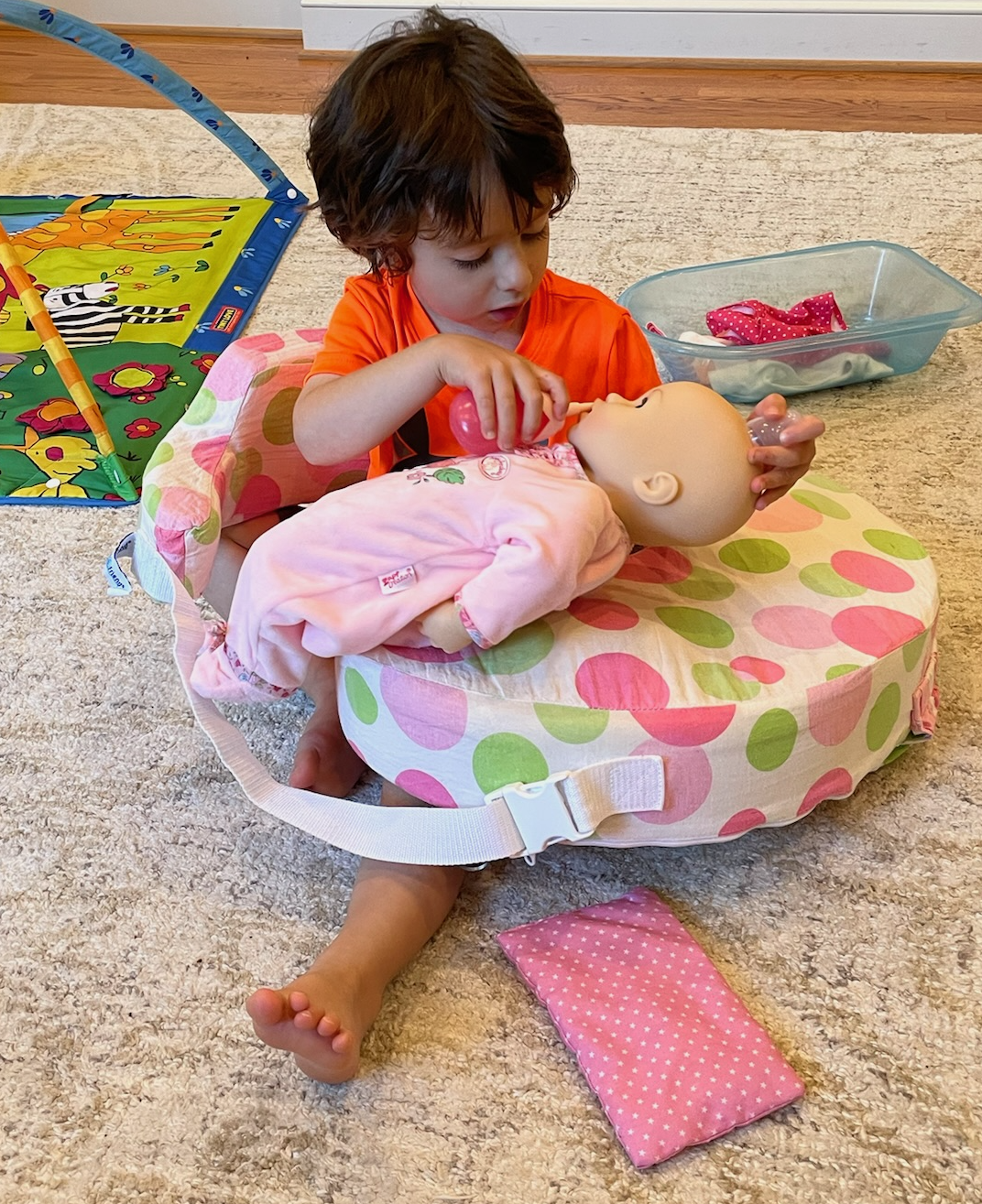Introducing Newborn to Sibling(s)
Having had three kids, I can honestly tell you that we probably overthink introducing newborns to their siblings.
My single biggest tip? Don’t stress about it.
Yes, this is going to be an important memory in your family’s history. But it's going to be okay, I promise, and you don’t have to do anything special necessarily.
Are there things you can do to help? Sure. But "parenting multiple kids" lesson #1 is that we are in less control than we think. And no matter how it goes, the kids will be alright.
General tips to introduce a baby to siblings
(Here are the top 10 general tips I recommend, but I can’t emphasize enough that figuring out the tips that work for your child developmentally — based on their temperament and age — are going to be the best. Scroll all the way to the end to see my favorite age-based tips).
Introduce the baby in a neutral spot
Your lap is your child’s safe place (no matter their age). Pick a neutral spot for the first meeting, rather than holding your newborn: bassinet, pack/play, car seat, stroller or even a playmat on the floor. This prevents the older sibling from feeling like their personal space has been invaded.
2. Special times
The Pediatrician Mom Tip: Especially if you’re transitioning from 1 to 2, you’re likely to feel a little overwhelmed in the first weeks. You may also fear that somehow your oldest will feel less loved, or that you won’t have enough love for the baby. These are normal fears.
Finding ways to connect with your older child will likely alleviate both these fears, but it can feel immensely pressure-filled to think about arranging “special” outings and events. Trust me, kids dont care. A little playground time, a few extra cuddles, maybe a McDonalds run to get milkshakes from the Drive Thru.
It’s hard to leave the baby, but if you have other trusted adults, the baby will be in good hands (and probably won’t care that you’re gone for a little while). These small moments can have a huge impact on your older child, sure, but they may have a bigger impact on you! A lot has changed, but some things will remain the same.
3. Minimize major transitions before baby arrives
Transitions are hard for most of us. Focusing on completing any transitions at least 4-8 weeks before baby arrives (eg: transitioning from a crib, weaning a pacifier, or potty training). Of course, some changes like school starting or job changes can't be avoided, but wherever possible, aim to make transitions ahead of time. This will decrease your stress most of all, which is probably the most important!
4. Use social stories
Research shows that books and shows about transitions help kids cope with them. Get a toy doll, and focus on some pretend play.
Pick some shows and books and watch/read together. Its a good (restful) task in that third trimester.
The Pediatrician Mom Tip: We loved the Daniel Tiger “Baby Margaret” series of books and shows for this.
5. Involve them in baby prep and baby care
Big kids love to help. Let them have some control over decisions in the baby preparations. Perhaps this means choosing nursery colors or decorations, but if you’re not making huge changes in the home, you can even let them pick smaller items like books or blankets. Even small tasks like getting a diaper bag ready can help them feel part of the process. Once baby arrives, pick-age-appropriate tasks they can help with.
The Pediatrician Mom Tip: I often get asked if you need to do a gift exchange between your child and the new baby. This is fine for an older child — it certainly won’t hurt. But I don’t think it is essential!
6. Plan for the first few weeks
Having a plan for the first few weeks after the baby comes can reduce your stress. Discuss things like whether your toddler should go to daycare after the baby is born and how to approach visitors with a newborn. Sticking to a predictable routine can be helpful for many kids, and trying to make these decisions when you’re already emotional and exhausted is tough.
The Pediatrician Mom Tip: Importantly: if you have visitors, encourage them to pay attention to the sibling first when they arrive, rather than going straight for the baby. This is helpful no matter the sibling’s age!
7. Minimize blaming the baby
Try not to blame the baby for times when you can’t give immediate attention. Some of this may be unavoidable - such as when the baby is hungry and your older child wants you to play, but where possible, keep commentary neutral. Instead of saying, “Be quiet, you’ll wake the baby,” try, “Let’s use our indoor voice,” or “Let’s play the quiet game and see who can whisper the longest!”
The Pediatrician Mom Tip: I also recommend using this in the opposite direction as well. Pick moments where baby is crying (but safe) and tell the baby “I’m helping <sibling> now, so you’ll have to be patient. I’ll help you next”
8. Encourage affection safely
The balance is hard to strike; we want our kids to be affectionate and gentle, but we also don’t want them to share germs with a vulnerable newborn. Encourage your toddlers to kiss the baby’s feet as a compromise!
9. Positive Reinforcement
No one likes feeling like they aren’t doing a good job, whether they're a toddler, kid, teen, or adult. Praise should be specific, rather than general. For example:“You did such a great job being gentle with the baby!” and “Thank you! I really needed your help to get the clean diaper!”
The Pediatrician Mom Tip: We have research showing that when children overhear something, they’re more likely to believe it. Compliment your child to grandparents or your partner while your child is within earshot.
10. Stock up on arts and crafts
Raid the Target Bullseye playground, Dollar Spot, and Michaels clearance section for cheap arts and crafts to keep your older child entertained. Or just lean into screentime for those first few weeks. I promise it won’t ruin your child.
Age-based extra tips
What worked for your neighbors newborn and 5 year old may not be as helpful for introducing a newborn to a 2 year old.
Here are my favorite extra tips based on your child’s age.
1 - 2 Years
At this age, they’re still very young and may not understand what having a new baby around means. They may struggle with being gentle or understanding your limited availability.
Expect more separation anxiety and frustration. These are developmentally appropriate at this age even without a baby in the mix. Meet them where they are (but maybe avoid leaving them alone with the baby).
Perspective. If they are not loving or gentle, this does not mean they won’t eventually have a positive relationship with the baby.
Stay positive and be playful if you can. Carve out short windows with just them (eg: 10 minutes in the backyard).
2 - 4 Years
It is developmentally appropriate for this age group to want to test boundaries and they may be aggressive. Remind yourself that they’re not doing it to punish you or because they are sociopaths (no matter how it seems!)
Try to carve out short windows for just you and your older child to bond. Get outdoors. This will likely help you feel better as well!
Allow them to help with age-appropriate tasks (bringing diapers, handing you wipes, picking out baby clothes, or entertaining the baby with songs or dances).
Encourage pretend play (eg with a baby doll). Lots of positive reinforcement for gentle hands!
Ask their advice and tell them stories about when they were that age, or show them pictures and videos (most toddlers love to watch videos of themselves)
If they’re not interested in the baby, don’t force it. Babies are, frankly, boring!
Expect some separation anxiety, frustration, or regression (my second, who was 3 years when his brother was born, completely regressed with potty training - it took a year to reset). This is normal, and you don’t have to solve every problem immediately.
5 Years and Older
Older kids often have a better idea of what the changes might entail, but they may still feel displaced, or anxious. They may have been excited in the lead up to the birth and then change their minds when they realize that babies are noisy, attention-grabbing and can’t play with them (yet). Depending on their temperament, some may adjust more smoothly while others may regress or become emotional or aggressive.
How they react in these moments does not necessarily have long-term implications about what their relationship will be to their sibling. Meet them where they are.
Work on naming feelings — and maybe even sharing some of the mixed feelings you might have about the birth. Remind them that it is okay to have mixed feelings about the baby and it does not make them a bad kid or a bad sibling.
Carve out special time with them if you can.
Ask for their advice or solicit help with age-appropriate tasks (reading to the baby, holding the baby if you feel like it is safe, or even running baths and preparing bottles - while supervised).
Encourage them to take photos of the baby with a kid-friendly camera (this is my favorite tip!)
Share stories about them as babies, or let them see pictures or watch videos from when they were little.
Let them be who they are. If they want to do their own thing and remain uninvolved with the baby at first, that is okay!














